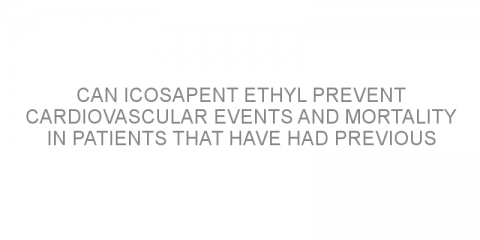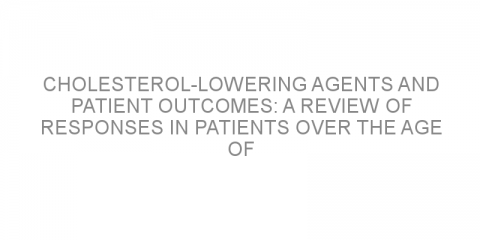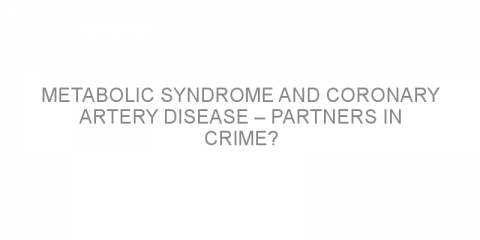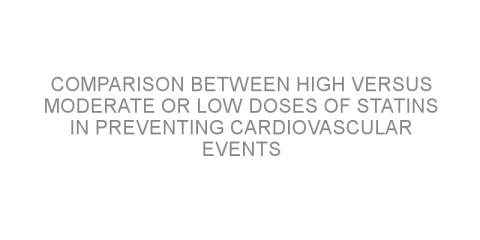In a nutshell This study evaluated the effectiveness and safety of high-dose rosuvastatin (Crestor) combined with telmisartan (Micardis) or amlodipine (Norvasc) on glucose metabolism in patients with atherosclerotic cardiovascular disease (ASCVD), hypertension (high blood pressure), and impaired fasting glucose (IFG or prediabetes). The...
Read MoreOther concurrent condition(s)-Hyperlipidemia Posts on Medivizor
Can icosapent ethyl prevent cardiovascular events and mortality in patients that have had previous heart attacks?
In a nutshell This study examined the effect of icosapent ethyl (IPE; Vascepa) on major cardiovascular events (MACEs) in statin-treated patients that had previous heart attacks (myocardial infarction; MI). The data showed that patients treated with IPE had large and significant reductions in MACEs. Some background Ischemic events are associated with a...
Read MoreDoes alirocumab benefit adults with familial high cholesterol levels?
In a nutshell This study was carried out in order to assess the safety and effectiveness of alirocumab (Praluent) in patients with homozygous familial hypercholesterolemia (FHC). The study found that these patients saw a significant reduction in cholesterol levels with the use of alirocumab. Some background Homozygous FHC is a genetic...
Read MoreIs a fixed-dose combination of candesartan and rosuvastatin effective at managing hypertension and high cholesterol?
In a nutshell This study investigated if a combination of candesartan (Atacand) and rosuvastatin (Crestor) is effective in treating hypertension and high blood cholesterol. They found that this combination was effective in these patients. Some background Hypertension or high blood pressure (BP) is common...
Read MoreCholesterol-lowering agents and patient outcomes: a review of responses in patients over the age of 65
In a nutshell This study investigated the effectiveness of cholesterol-lowering agents on cardiovascular outcomes in patients aged over 65. They found that statins reduced the risk of cardiovascular events including heart attack and death. Some background Coronary artery disease (CAD) is caused by blockages in the arteries supplying blood to...
Read MoreEvaluating an implantable device for early recognition of a heart attack
In a nutshell The aim of this study was to examine how effective a new implantable device is in recognizing and alerting patients that they are having a heart attack. The main finding of the study was that the device successfully detected heart attacks and alerted patients of a potential blockage of their blood vessels. Some background Heart disease...
Read MoreSearching for patients with coronary artery disease to test a new medication
In a nutshell This phase 3 trial will determine if bempedoic acid (BPDA) reduces the risk of cardiovascular events (CVEs) in statin-intolerant (ST-IT) patients. The main outcome will be the time taken for a CVE to occur. The details Cardiovascular disease (CVD) is a serious condition that can lead to serious events (CVEs). CVEs include heart...
Read MoreAre PCSK9 inhibitors effective in heart disease?
In a nutshell This paper reviewed the role of proprotein convertase subtilisin/kexin type 9 (PCSK9) inhibitors in the treatment of heart disease. Some background PCSK9 is a protein that is involved in the breakdown of fat. A mutation of PCSK9 can increase the risk of the disorder...
Read MoreWill an intensive statin treatment change composition of plaque?
In a nutshell This paper studied the effect of an early intensive statin treatment in patients who have had a heart attack. Some background Plaque occurs when fat (cholesterol, for example) and other types of cells (calcium, for example) build up into a waxy substance in the blood vessels. When these plaques rupture, they can obstruct the blood...
Read MoreMetabolic syndrome and coronary artery disease – partners in crime?
In a nutshell This study investigated whether having metabolic syndrome increases the risk of heart-related death in patients with coronary artery disease. Some background Metabolic syndrome is a combination of conditions including increased blood pressure, high blood sugar, excess body fat, and abnormal cholesterol levels that occur...
Read MoreA new drug for the treatment of hypertension – phase I clinical trial
In a nutshell This phase II trial evaluated the benefit of a new drug of the aldosterone synthase inhibitors class in the treatment of high blood pressure. Different doses of this new drug were compared to a placebo, and the effects on blood pressure were reviewed. Some background Aldosterone is a hormone produced by the adrenal glands, and a key...
Read MoreComparison between high versus moderate or low doses of statins in preventing cardiovascular events
In a nutshell This study investigated whether higher doses of statins significantly improved cardiovascular outcomes compared to moderate or low doses. Some background Statins are a group of drugs used to lower cholesterol levels in the body. They notably reduce LDL-cholesterol levels, commonly referred to as the "bad" cholesterol....
Read More












